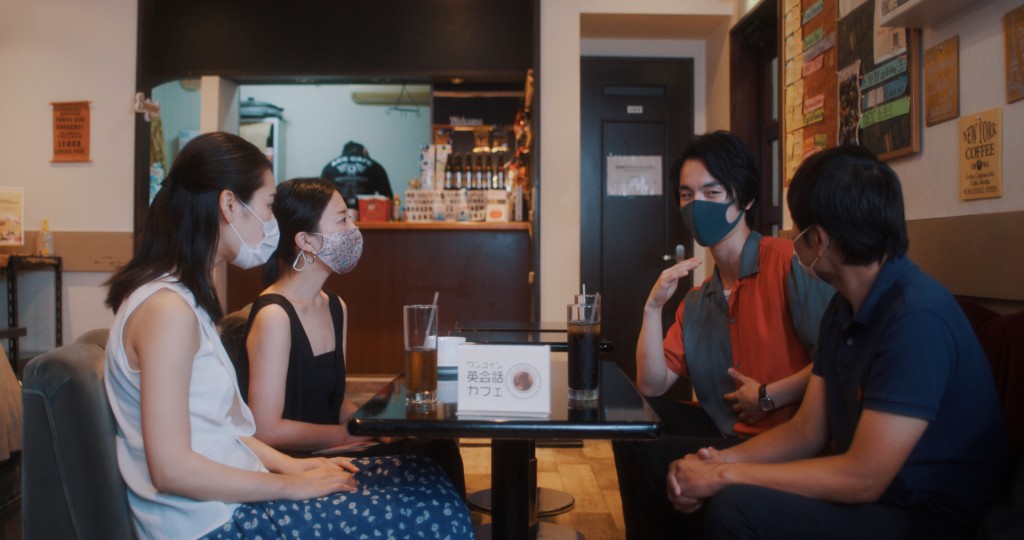Introduction
Masaya Tsutsumi is another young director who is trying to make a name for himself in indie-scene of Japanese cinema. After making two YouTube web series, Smartphone Kamen and Urashima Taro, he delivers his first feature film, In Another Language.
Review
2020. One day, in a corner of a One Coin English Cafe, Kenji (Kosuke Fujita), an young actor who wanted to work in the US but who, due the corona restrictions, remains stuck in Japan, partakes in a casual English conversation. In this cafe, he meets Miki (Makoto Kikuchi), who tells him that she recognizes him from a role he played in a small movie.
Yet, Kenji confirms, by inventing a non-existing movie he starred in, that she merely is lying. After both leave the cafe, he decides to follow her and confront her. She confesses to him that everything she said at the meeting was a lie. After a second chance encounter, Kenji and Miki start playing a game-of-lies at English Conversational Cafes. There are two rules to the game: Stay out of each other’s lives and Don’t lie in Japanese.
In Another Language is a heart-warming narrative that utilizes the unresolvable tension between lie and truth at the level of speech to tell a touching but straightforward romantic narrative (Structure-note 1).
The game of lies and truths starts by confronting the spectator with the following question: Why does Miki feel the need to lie? Why does she feel the need to pretend to others that she is living an exciting life? It should be evident that she utilizes these moments of fantasizing to escape, for a fleeting instance, the ‘unsatisfactory’ position she holds within the societal field. Yet, her fantasizing is only effective, only able to give her a moment of pleasure, is she succeeds to dupe the other. It is, in other words, not enough for Miki to address her fantasies to others, but persuade these others to give a certain credibility to her fantasy and affirmatively recognize the ‘desirability’ of her fantasized position (Narra-note 1).
The fact that she has an ‘unsatisfactory’ position within the societal field is also underlined by the fact that she flees from English cafe to English Cafe – she has no interest in forming relations, the first rule of the game, and how she, while conversing with Kenji in Japanese, keeps as much things as possible unsaid about her personal life. Yet, will their repetitive encounters at English cafes and the pleasure they both share in duping the other not lead her to lower her guard and cause something of a romantic interest to blossom between them? What will happen to their superficial bond if either Kenji or Miki decides to lie their truth? And what if a ‘pleasant’ lie is taken for a ‘honest’ truth by either one of them? Can Kenji and Miki escape the deceptive dynamic that marks their relationship and give, in some way or another, expression to the truth of their romantic desire (Psycho-note 1)?
What makes In Another Language so pleasant is the natural flavour of the conversations. It is by relying on such naturalism – e.g. the awkwardness caused by certain unexpected signifiers, the failure to hear irony and sarcasm, slip of the tongues, … etc. – that Tsutsumi is able to give the relational trajectory of the Kenji and Miki a certain genuine feel and to make the light-hearted import of other conversational moments effective.
The composition of In Another Language stands out due to its pleasant dynamism. While Tsutsumi’s dynamism is often merely for variety’s sake, he does succeed in creating a composition that is easy-to-watch and succeeds in strengthening the more dramatic moments in the narrative. The compositional decorations (e.g. Tsutsumi’s play with the split-screen technique, slow-motion, … ) are not only compositionally interesting but also heighten the visual pleasure of the overall narrative.
The mood of In Another Language is determined by the musical accompaniment. The quirky musical pieces do not only echo the light-hearted nature of the narrative, but also allows the romantic flavour of the narrative come to its full right.
In Another Language is an enjoyable indie romance narrative that elegantly plays with the fact that lie and truth are fundamentality interwoven within a subject’s speech. With this narrative, Tsutsumi does not only prove that he can create interesting stories, but also that he can bring his story to life in a visually pleasant manner. We are looking forward to what he has in store for us in the future.
Notes
Structure-note 1: If we utilize the signifier straight-forward, it is to underline that, like many romance narratives, the actual romance is something that will take place in the future. This postponement of the romance allows the spectator to imagine that a harmonious sexual relationship can be written.
Narra-note 1: The lies she tells at English cafes are, as the spectator eventually learns, not without a grain of truth. What she presents to the other concerning her work-situation, for instance, is nothing other than an image of occupational success that she, due to failing her job interviews, cannot assume, at the symbolic level, in the societal field.
Psycho-note 1: The beauty of the narrative lies in the fact that it ultimately shows that interacting with the other is fundamentally riddled with deception and self-deception. Subjects are, day in and day out, busy with manipulate the social field via signifiers to protect their own ego, keep the other at a safe distance from their subjective discontent, and to avoid the confrontation with imaginary injuries that are integral to the game of romance.



